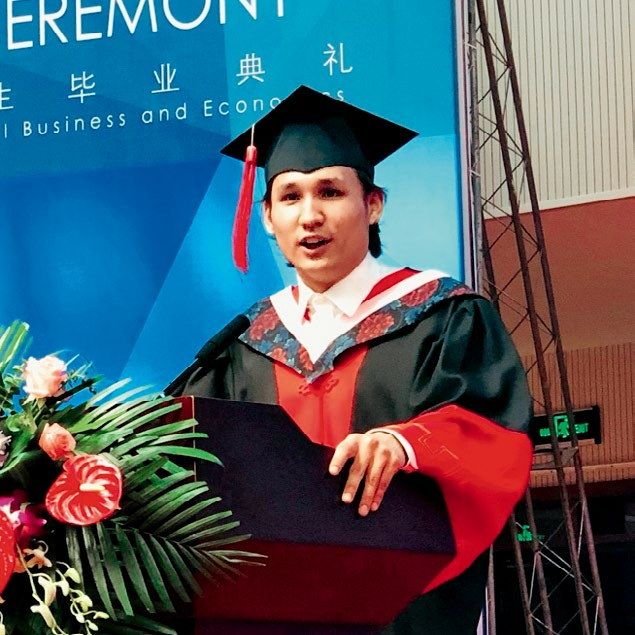
In 2019, Akniyazov Таmerlan delivers a speech at the graduation ceremony for international students of the University of International Business and Economics (UIBE).
My 'Journey to the East'
I was born in Sakhalin Island and grew up in the Zhetysu region in the southeast of Kazakhstan. After graduating from high school in 2007, I enrolled in a local university in Kazakhstan, intending to major in physics. However, one summer evening, my father came home from work with an enrollment brochure from China's Tongji University in his hand. He approached me and asked, "Do you want to study abroad?" Longing for independence at an early age and eager to explore the outside world, I agreed without hesitation. Not long after, I was sitting on the train bound for Shanghai, China, starting my "Journey to the East."
Today, China's high-speed railways span the whole country, epitomizing what has come to be known as the "Chinese speed." Renowned for their speed, safety and popularity, these railways have become one of China's "four great new inventions." But when I first came to China, it took nearly 50 hours to travel from Xinjiang to Shanghai by train. I shared a compartment with a couple and their daughter, a little girl about six years old, in the following two days.
The girl, sitting quietly opposite me, spent her time carefully practicing writing, pausing occasionally to snack. She soon noticed me and, out of curiosity, began stealing glances in my direction. As she prepared to eat an apple, she suddenly passed it to me and said, "Chi!" "Chi" means "eat" in Chinese. I didn't understand her right away. Noticing my confusion, she slowly wrote the word "吃" on the paper using her pencil, and then repeated it aloud as she reached out her little hand holding the apple. This time, I understood what she meant and accepted her "gift." I said the word "chi" after her and took a bite of the apple. In that instant, a look of excitement crossed her face, but soon the face grew serious. Suddenly, she stood up while shouting "zhan," meaning "stand," before sitting down with the word "zuo," meaning "sit." She then repeated "stand up" and "sit down" in Chinese. A "military training" began in the train. The passengers around us could not disguise their amusement at such a lovely girl. By the time I said goodbye to my "little Chinese teacher" and her parents at the Shanghai Railway Station, I had gotten the hang of some common Chinese words and learned to count. This experience laid some groundwork for my subsequent Chinese study in China.

